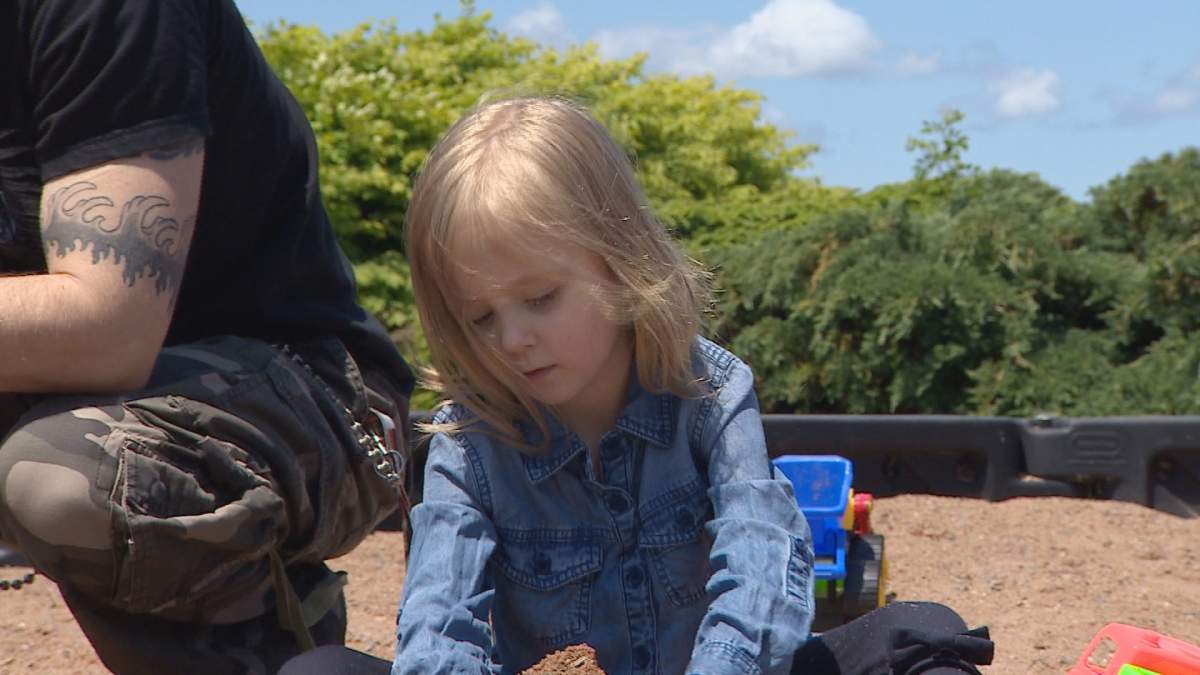After spending just a few minutes with her, it’s clear Nova Wamboldt is a bright, engaging little girl. But the four-and-a-half-year-old is also struggling.

She isn’t potty trained yet and her parents say she’s well behind her peers when it comes to communication.
“She does not understand how to use her words in a communicative fashion,” said Krista Huskins, Nova’s mother.
“So we’ve struggled with that a lot, it’s very frustrating for her.”
READ MORE: Autism Nova Scotia sees 50 per cent hike in calls about complex autism cases
Several months ago, Huskins sought out a referral for an autism assessment. Because it takes up to three hours, it can’t be done by a family doctor. After trying several avenues, she was put in touch with resources in her hometown of Liverpool, N.S., and got a referral. But it’s going to take time.
“Right now, it’s at least six months,” Huskins said.
Nova is one of 631 children waiting for an autism assessment, according to the IWK Health Centre. Of those, 358 are under the age of six.
The remaining 273 are over age six and in school already.
Huskins wants Nova to get into an early intensive behavioural intervention (EIBI) program, which is a 12-month program for children under the age of six. It, too, has a waiting list.

Get weekly health news
Nova will be ineligible for EIBI in 18 months and with up to a year of waiting lists ahead of her, Huskins worries she won’t be eligible in time.
READ MORE: Review of N.S. autism services kept private despite acknowledgement of gaps
The manager of the EIBI program in Halifax says the waiting lists across the province are managed by age.
“With EIBI we are to offer the next spot to the oldest child who has received a diagnosis or a provisional diagnosis,” said Heather Osborne-Vincent.
“We can say that all children are offered EIBI before they’re required to be in school at age six.”
Osborne-Vincent says the only exceptions are children who are referred for an assessment after the age of five. But even those who are offered a spot in the program may not get a full year.
“There is evidence of the effectiveness of EIBI for a 12-month period and there’s limited evidence of its effectiveness for a six-month period,” Osborne-Vincent said.
“That information is shared with families, and the context of the amount of time available before someone is required to be in school is a factor.”
WATCH: N.S. family fears for safety as they care for son with autism

As of March, 310 children were in EIBI programs across the province. Another 203 children were waiting to get in. Osborne-Vincent says the wait lists fluctuate because most children start the program between July and October, so they’re longest in the spring.
The province spent $13 million of its $15-million autism support budget on EIBI this year.
Huskins says if she was able to pay thousands of dollars for a private assessment, she could get Nova diagnosed and get her onto the EIBI wait list sooner.
She’s pleased to hear of new supports coming to classrooms this fall for children with autism but says even with an autism specialist her daughter isn’t ready for school yet.
“I think of my other two kids at this age and they were getting ready for school, they were writing their names,” Huskins said. “We were preparing them for that next step in their life and it just seems like no matter what we do or how much we work with her, she’s just not there yet.”
READ MORE: Nova Scotia to hire more than 190 professionals to help with classroom inclusion
Nova’s father, Daniel Wamboldt, says he’s considering homeschooling her, and he’s searching for information to help teach her to cope.
“As a dad I just want to know that she’s going to have the best quality of life she can have,” he said.
The family says they’ve been able to access some help through other provincial programs, but EIBI is her best option.
“We’re waiting essentially for us to be told that she’s no longer eligible for a program that she truly needs,” Huskins said.

_11pm_version_with_sign_off_1_848x480_1273298499970.jpg?w=1040&quality=70&strip=all)







Comments
Want to discuss? Please read our Commenting Policy first.